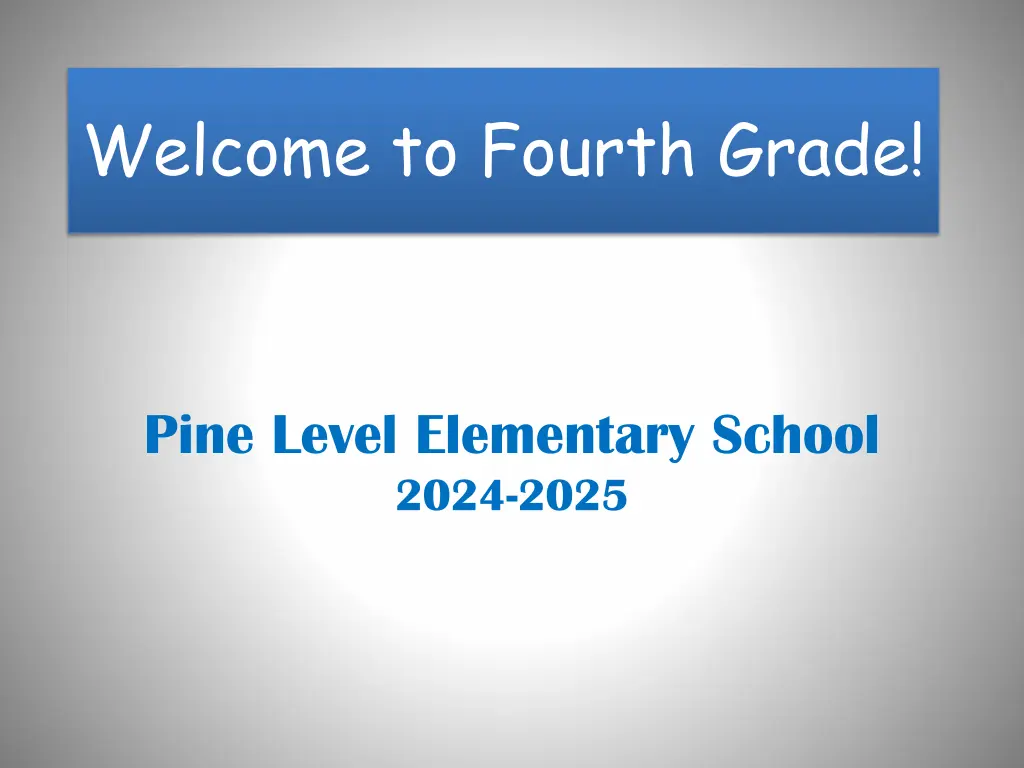
Fourth Grade Language Arts and Math Skills Overview for Students
"Explore the key language arts and math skills for fourth-grade students including story elements, reading comprehension, writing techniques, multiplication facts, fractions, and more. Prepare your child for a successful fourth-grade year at Pine Level Elementary School."
Download Presentation

Please find below an Image/Link to download the presentation.
The content on the website is provided AS IS for your information and personal use only. It may not be sold, licensed, or shared on other websites without obtaining consent from the author. If you encounter any issues during the download, it is possible that the publisher has removed the file from their server.
You are allowed to download the files provided on this website for personal or commercial use, subject to the condition that they are used lawfully. All files are the property of their respective owners.
The content on the website is provided AS IS for your information and personal use only. It may not be sold, licensed, or shared on other websites without obtaining consent from the author.
E N D
Presentation Transcript
Welcome to Fourth Grade! Pine Level Elementary School 2024-2025
Welcome Fourth Graders! Fourth Grade is a year when students are able to build upon the foundation of reading and math skills and concepts they learned in third grade. They will also be encouraged to become more independent and responsible. The information in this presentation will make you aware of various skills for language arts and math as well as personal and social responsibilities that students should have as they enter fourth grade. Thank you for taking the time to review this presentation. We hope the information will be useful to you and your child.
Language Arts Describe basic elements of stories (characters, events, & settings) by drawing on specific details in the text Pay close attention to key features of informational books and articles, including main and supporting details; compare and contrast information; and explain how an author uses facts, details, and evidence to support particular points Compare ideas, characters, events, and settings in stories and myths from different cultures
Language Arts (continued) Write summaries or opinions about topics supported with a set of well-organized facts, details, and examples Read fiction and non-fiction daily Write complete and compound sentences with correct capitalization, spelling, and punctuation Write legibly in cursive Read with expression while pausing at commas and stopping at periods Read for 30 minutes in one sitting without pause to build endurance
Math Memorize all multiplication facts Use whole-number arithmetic to solve word problems, including problems with remainders and problems with measurements Add and subtract whole numbers quickly and accurately (numbers up to 1 million) Multiply and divide multi-digit numbers in simple cases (e.g., multiplying 1,638 7 or 24 17, and dividing 6,966 by 6)
Math (continued) Understand and apply equivalent fractions (e.g., recognizing that 1 4 is less than 3 8 because 2 8 is less than 3 8) Add, subtract, and multiply fractions in simple cases (such as 2 3 4 1 1 4 or 3 5 8), and solve related word problems Understand simple decimals in terms of fractions (e.g., rewriting 0.62 as 62 100) Measure angles and find unknown angles in a diagram
Personal and Social Responsibilities Treat others kindly and with respect Has a good attitude and is responsible for their learning Listens and follows directions Completes assignments in class and at home Converses with others using the rules of listening, asking questions and waiting their turn to respond Remains on task during independent work
Parent Expectations and Suggestions Speak positively about school and staff. If you are excited about learning, your child will be too. Communicates with teachers and signs weekly folder. Take time to talk about the school day. Help with homework. Make sure student is prepared for school with needed items and supplies. Make sure the student gets plenty of rest each night. Makes attendance at school a priority. Take time each day to talk to your child about anything and everything. Have your child read independently every day. Ask them to tell you about the reading.
Expectations and Suggestions (continued) Watch the news together and discuss it. Urge your child to use logical arguments to defend his or her opinion. Involve your child in activities and games that require listening and following directions. Support your child s independence and encourage responsibility by having them pack for a trip or weekend outing, care for belongings, help prepare meals, complete chores around the house, and assist with other everyday activities. Provide opportunities to interact with other children. Encourage work values such as effort, persistence, and initiative.
Back to School Events Tentative Back to School Event: August 5th - 2:00- 6:00 pm First Day of School: August 7th Open House: TBD
